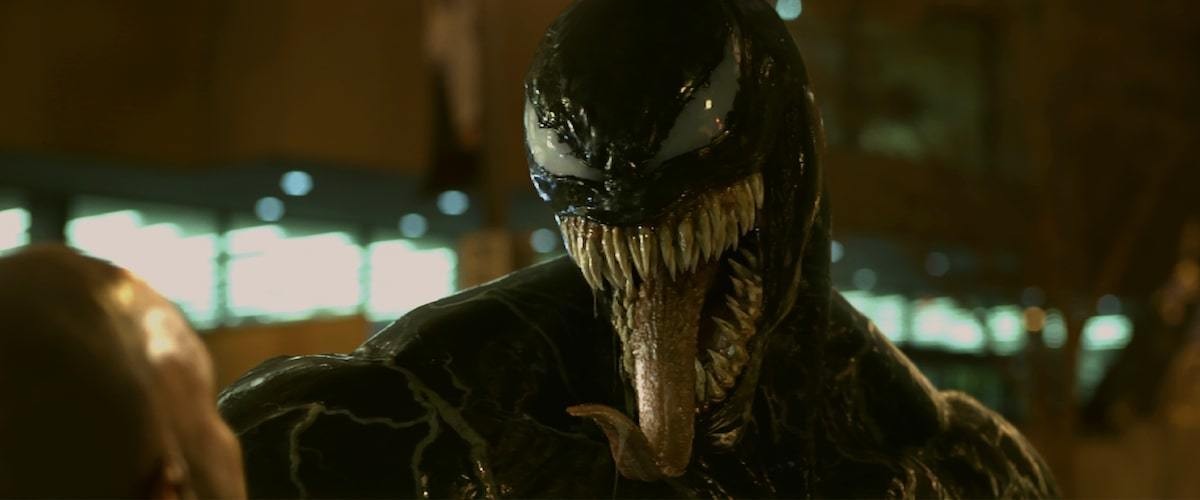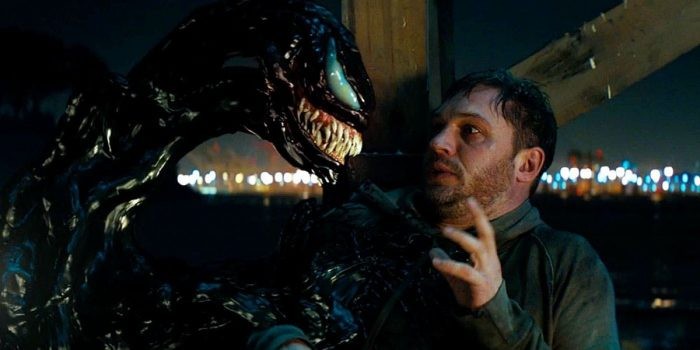
By virtue of an odd look or a silly voice, Tom Hardy has been the best thing in event pictures like The Revenant or The Dark Knight Rises. In that context he’s the triumph of mannerism, of the strange and idiosyncratic winning out over supposedly epic but mostly empty things. In the former he delivers a strange monologue about how his Dad ate a squirrel that was God, and it’s the most sincere thing in the movie. In the latter he is so resolute while wearing a bondage mask in an otherwise contractual Batman trilogy ender that people have imitated his voice for years.
It is unfortunate that Ruben Fleischer’s Venom repeats the pattern, and doesn’t craft him a better vehicle. Venom sprang from Spiderman’s rogues’ gallery, which was divvied up to make a buck. Spiderman has been licensed back to Marvel Studios, but Sony still owns his nemesis. So we get a formulaic hero origin story for a nightmarish monster.
Venom is one of three alien Symbiotes (or parasites, as they don’t like to be called) brought back from space to merge with involuntary human hosts. Defined by his evil Spiderman look, lusty tongue and large number of teeth. Venom infects investigative journalist Eddie Brock (Hardy) when Brock gets too close to Steve Jobs/Elon Musk amalgam Carlton Drake (Riz Ahmed) and his alien experimentation on the homeless.

Tom Hardy (right) in Venom
In the opening minutes Brock loses, in the manner of an 80’s movie or a comic you bought and finished in 15 minutes, his job, his girlfriend Anne and “everything I ever cared about.” Michelle Williams, who plays Anne, has had a career similar to Hardy. She’s associated with sincere arthouse dramas, but like Hardy’s beginnings in Star Trek, she started in the Halloween franchise and Dawson’s Creek. Fleischer uses both actors well. He doesn’t try to chain their sincerity to the bargain basement blockbuster plot (color graded dark blue and green, so you know the world is tough), but instead plays up their sense of humor, emphasizing their mundane reactions to terrible and ridiculous things.
As Brock, Hardy’s built an entire character around the moment in Star Wars when Han Solo stammers “We’re all fine here now, thank you. How are you?” He is constantly interrupting his own apologies and muttered explanations, his voice breaking in a transplanted New York accent that Williams matches. Once infected, he’s wonderful, apologizing to henchmen as his CGI self disembowels them, sating parasitical hunger with gross meals of chocolate and tater tots, going to a restaurant and bathing in a lobster tank, then eating the lobsters. He also voices the interior Bane-like voice of Venom, who is everything Eddie isn’t: Suave, powerful, and prone to wax eloquent about how delectable pancreata are.
The tone doesn’t gel. The action scenes, when they get away from the comedy of a mild-mannered guy apologizing for his uncontrollable urge to violence, are the same ones that you’ve seen all your life, and which will continue after you’re dead. There is a long car chase with black SUVs, and a de rigueur end fight between two identical visual effects. San Francisco is mainly defined here by inclined streets and the homeless, though photographed at night so that it looks like cinematic New York. Paul Thomas Anderson muse Melora Walters shows up in another downtrodden role as a vagabond with grime on her face. Jenny Slate plays a scientist whose thick glasses define her non-character.

Michelle Williams on line one.
Another way in which it reminded me of a colorful 80’s movie: Poverty is just a fact of life, and the homeless are punchlines or plot points. The evil CEO is God-like. Or if not the 80’s, it’s like a 30’s B-picture: fun and funny in small bits, but unable to have the plot follow the choices of its characters in unexpected directions.
The scary images of the Symbiotes entering people’s skin and undulating beneath are just gatekeepers to a power fantasy, one the movie cops to when a character muses on how nice it was being possessed. The problem is there are more modes of being in the world than idiotic idealists and omnipotent CEOs. For example, the corporations that have messed with the Spiderman universe are not run by evil geniuses. They’re just part of a system that perverts art for money.